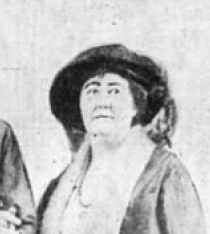
Many mountain residents know the story of Holy City, founded in 1918 by Father William E. Riker, who died in 1969. But not so many people now remember his wife Lucille, who was a college-educated woman from a well-to-do family in the Midwest, and who had met Riker on one of his preaching junkets. Even fewer people remember now that Lucille was a poet and a songwriter who was actively trying to break into the music market as late as 1941.
Before Riker and the disciples of the Perfect Christian Divine Way (PCDW) moved to the clearing in the woods that became Holy City, they lived at church headquarters at 674 Hayes Street in San Francisco. A 1918 edition of The Enlightener, the PCDW newsletter, features Lucille’s poetry, which was of the sentimental type found in women’s magazines of the time. But instead of stanzas rhapsodizing about sunsets and apple-cheeked children, from the beginning Lucille’s poems were written in support of her husband’s religious ambitions. That didn’t mean she ignored other subjects—in 1926 the Holy City Press published “Facts About San Francisco,” a 20-stanza paean to her favorite city.
San Francisco, the great metropolis
Of the Golden West, serene—
Reaches out her arms of welcome
With the grace of a real Queen.
To the waters round about her,
She bestows on them a smile
When she sees the ships in harbor,
Metropolitan in style. (1)
But the bulk of Lucille’s output was religious in theme, supporting Riker’s doctrines and philosophies. As time went on and he became more blatantly white supremacist in his writing and speeches, Lucille’s poetry sought to soften his rhetoric and re-establish the spiritual element that had been there in the beginning, as in “The Divine Plan” from 1931:
O, blessed be the human race,
When once they find their lawful place;
Each one in order at the wheel,
Will bring forth heaven that is real—
Upon this earth is the ideal place
To witness heaven and God to face;
This earth is fairyland as well,
When woman can bid adieu to hell.
An angel is a human being,
With mind pure, and eye all seeing;
Man is a God, when conscience is clear
To onward press, and know no fear.
Equality means all on a level,
A balance, then you have tied the Devil. (2)
For the PCDW (known to its critics as the Pacific Coast Devil Worshippers, probably as a result of Lucille’s poem “Devil Worship”) was not exactly a church. Back in his single days, when he was a tie salesman, Riker saw that the best way to relieve people of their money was not in neckwear, but in religion. He tried being a fortune-teller, then a yogi, and finally became a traveling street-corner preacher, which is when his instincts proved to be right and he saw his greatest success. With Lucille and her business brain by his side, the PCDW began to make money, and when the group moved to the Holy City site, its moneymaking possibilities kicked into high gear. Lucille’s poem “My California Home Among the Trees” from 1932 illustrates why:
Automobiles by the score,
Each day pass by my door
Seeking pleasures, scenery and rest.
They have left their city home,
To in the mountains roam
Among the tall trees God has blessed. (3)
(1) Riker, Lucille, Facts About San Francisco (Holy City: Holy City Press, 1926), University of California Santa Cruz, Special Collections
(2) Riker, Lucille, “The Divine Plan,” in Hurrah, Vol. 1, No. 7, page 3 (Holy City: Holy City Press, November 1931).
(3) Riker, Lucille, “My California Home Among the Trees,” in Hurrah, Vol.1, No.12, p. 5 (Holy City: Holy City Press, April 1932), I.B. Fisher Collection, Folder 1932, collection of the author.
Copyright 2019 by Shelley Adina Bates. First printed in the Mountain Network News, Vol. MMXIX, No. 7 (Los Gatos: July 2019)
1 thought on “The Poet of Holy City (part 1)”
Comments are closed.